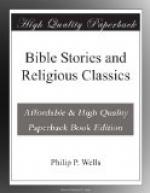When this Pickthank had told his tale, the judge directed his speech to the prisoner at the bar, saying, Thou runagate, heretic, and traitor, hast thou heard what these honest gentlemen have witnessed against thee?
Faith. May I speak a few words in my own defence?
Judge. Sirrah, sirrah, thou deservest to live no longer, but to be slain immediately upon the place; yet that all men may see our gentleness toward thee, let us hear what thou hast to say.
Faith. 1. I say, then, in answer to what Mr. Envy hath spoken, I never said aught but this, that what rule, or laws, or customs, or people, were flat against the word of God, are diametrically opposite to Christianity. If I have said amiss in this, convince me of my error, and I am ready here before you to make my recantation.
2. As to the second, to wit, Mr. Superstition, and his charge against me, I said only this, that in the worship of God there is required a divine faith; but there can be no divine faith without a divine revelation of the will of God. Therefore, whatever is thrust into the worship of God, that is not agreeable to divine revelation, cannot be done but by a human faith, which faith will not be profitable to eternal life.
3. As to what Mr. Pickthank has said, I say—avoiding terms, as that I am said to rail, and the like—that the prince of this town, with all the rabblement, his attendants, by this gentleman named, are more fit for a being in hell than in this town and country. And so the Lord have mercy upon me.
Then the judge called to the jury—who all this while stood by to hear and observe—Gentlemen of the jury, you see this man about whom so great an uproar hath been made in this town; you have also heard what these worthy gentlemen have witnessed against him; also you have heard his reply and confession: it lieth now in your breast to hang him, or save his life; but yet I think meet to instruct you in our law.
There was an act made in the days of Pharaoh the Great, servant to our prince, that, lest those of a contrary religion should multiply, and grow too strong for him, their males should be thrown into the river. There was also an act made in the day of Nebuchadnezzar the Great, another of his servants, that whoever would not fall down and worship his golden image, should be thrown into a fiery furnace. There was also an act made in the days of Darius, that whoso for some time called upon any God but him, should be cast into the lions’ den. Now, the substance of these laws this rebel has broken, not only in thought—which is not to be borne—but also in word and deed; which must, therefore, needs be intolerable.
For that of Pharaoh, his law was made upon a supposition, to prevent mischief, no crime being yet apparent; but here is a crime apparent. For the second and third, you see he disputeth against our religion; and for the treason that he hath confessed, he deserveth to die the death.




